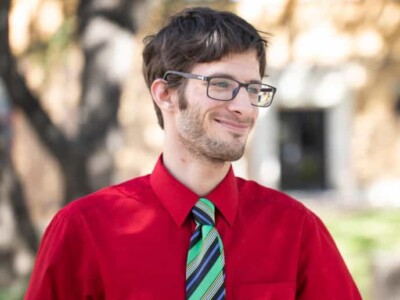January 16, 2000, is a day Travis Hand will never forget. It’s the day he and his siblings were removed from their home and moved into a shelter.
“We had nothing but a plastic bag with our school supplies and whatever was on our back,” he said. “From there, everything we collected we held on to. It was all we had.”
Hand, who is a senior social work major at UT Austin, said his childhood experience pushed him to pursue social work – as a former foster youth, he always knew he wanted to work with this population. After graduating with his bachelor’s in May, Hand plans to continue his education in the master’s program at the Steve Hicks School of Social Work. But his journey to this point was far from easy.
Before coming to the Forty Acres, Hand was a full-time student at University of Houston-Downtown. He juggled jobs and extracurricular activities until it became too difficult to find a balance between college life and making a living.
Three years later, Hand enrolled into Lone Star College using the State College & Tuition Waiver, which allows former foster youth to attend a supported state college or university, tuition-free. Even with the tuition waiver and a full-time job, Hand still couldn’t afford to live off-campus. Determined to stay in school, he used student loans to pay for his housing, racking up $17,000 in debt.
His time at Lone Star College allowed him to get involved in extracurricular activities and become a leader in his community. His leadership created an avenue for him to receive the Terry Foundation Transfer Scholarship, which supports “non-traditional students who are transferring from a Texas community college or university and are working toward their first bachelor’s degree.” The scholarship allowed Hand to transfer to The University of Texas at Austin in 2017. He’s made it his mission to help former foster youth at UT Austin ever since.
Hand is the first intern for the Spark Program, a Texas Institute for Child & Family Wellbeing program that empowers individuals who aged out of foster care and are attending UT Austin by connecting them to the support and resources they need to successfully graduate. As a Spark intern, Hand leads SparkTalks, where foster alumni have the opportunity to learn and discuss various ‘adulting’ topics such as money management, credit building and how to apply for different types of insurance.
“These topics are often not taught in high schools, and while many students have strong support systems to guide them through, often we find that foster youths do not have access to those same support systems,” Hand said. “Having these SparkTalks are another way to give our foster alumni the knowledge and tools needed to make their own decisions, control their own future, and write the narrative they see fit.”
Hand also works with Spark Program Director Shannon Mann-Butler to help students get school supplies for classes and Bevo Bucks for food assistance and other needs – for instance, he helped one student obtain a laptop and drawing tablet through Foster Angels of Central Texas.
Mann-Butler said Hand plays a vital role in Spark’s success. In addition to connecting with youth, serving as an advocate and providing resources, Hand collaborates in writing grants that will directly benefit the students and youth and he’s created a formal intake procedure for the program including a safety plan for all students.
“Travis has made a huge impact on this program and I can proudly say he’s positively influenced every student,” she said. “He will be a major part of the outreach happening this summer to students, staff and faculty. We hope to reach many more students in need of support. Having a full-time intern dedicated to making Spark a sole priority has been a game changer.”
Mann-Butler said it’s estimated that there are currently more than 4.6 million “opportunity youth” (individuals ages 16 – 24 who are not enrolled in school or participating in the labor market) in the United States and many of them are believed to be former foster youth. The Spark program relies heavily on Federal Student Aid applications, and partnerships with New Student Services and Financial Aid to identify former foster youth at UT Austin.
“We know college education is important to young adults who age out of care, but there is a wide gap in degree attainment compared with their peers who do not have the same challenges, including lack of financial and emotional support, frequently changing schools, lack of awareness of resources provided and at times distrust of the systems that provide resources,” Mann-Butler said.
Through Spark, Hand has connected with 13 former foster youth pursuing an education on the Forty Acres. But his work is just getting started. Hand is currently finalizing a partnership student group organization called the Spark Student Leadership Group, which will launch next year and will give former foster youth opportunities to engage in activities as leaders in the community. He’s also planning events to create opportunities for Spark students to experience relationship building, public speaking, cultural awareness and more.
Hand said he looks forward to continuing to make an impact on current and former foster youth and encouraging everyone else to do the same.
“To my fellow social workers, never stop growing and never stop using the reason you came here as a way to keep going forward,” he said.
To learn more about the Spark Program or to get involved visit spark.socialwork.utexas.edu/ or email Shannon Mann-Butler (Shannon.Mann@austin.utexas.edu).
By Montinique Monroe. Published May 1, 2019.


